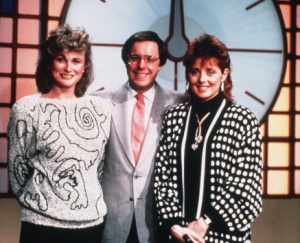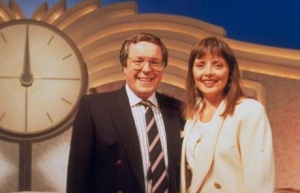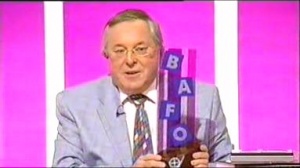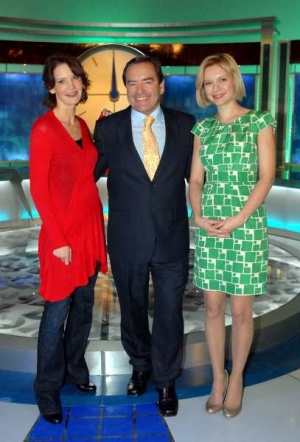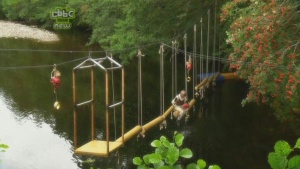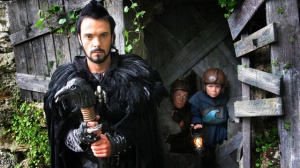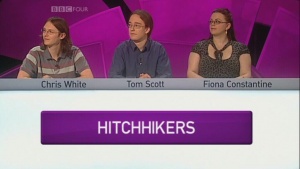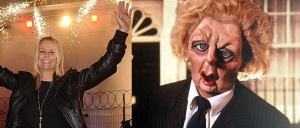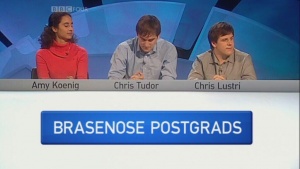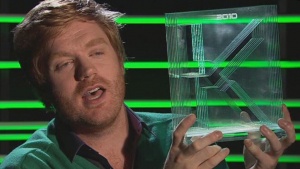Weaver's Week 2010-03-14
Last week | Weaver's Week Index | Next week
Minor British Institutions
Contents |
Countdown
YTV for Channel 4, 2 November 1982 – present (4999 episodes as of 15 March 2010)
Though this column's been running for nine years, we've never recapped the story of Countdown through our eyes. Like four million other people, we saw the first episode on 2 November 1982. Unlike 3.7 million of those people, we saw the second episode the next night, and it was better than the first one. Not by much, though, and so began a pattern of watching only the occasional episode, when there wasn't too much homework to do, when there wasn't anything more interesting on the other sides. Dramarama would always be preferable to the letters-and-numbers game, but some boring wildlife show was entirely missable.
Countdown's variable start times didn't help anyone to find it – the show was only on four times a week for the first few series, started as late as 5.30 in some series, and didn't settle into its 4.30 slot until autumn 1984. By missing many of the early series, we didn't appreciate the talents of such greats as Mark Nyman and Harvey Freeman. Instead, we were interested in the guests of dictionary corner, Bill Tidy drawing a little cartoon, Richard Stilgoe making anagrams out of the contestants names, Gyles Brandreth and his wordplay.
It wasn't until we heard about the wonders of Allan Saldahna in 1988 that we started to seriously make time for Countdown. Saldahna won eight games while aged just ten, and was the first of the child prodigies – he'd be followed by Tim Morrissey (1989), Wayne Summers (1992), and Tanmay Dixit (2005). Saldahna was pitted against Morrissey in a special to mark Countdown's 1000th episode in summer 1990, and again on the Countdown Masters slot at breakfast, winning both encounters. Summers was the only one of these prodigies to win his series, though Morrissey was crowned Champion of Champions in his time.
Perhaps it helped that Countdown had become something of a family affair – former contestant Mark Nyman was in the production office, alongside Michael Wylie. 1994 champion Damian Eadie would join them some years later. The programme had familiar faces – Richard Whiteley sat on the left of the screen for many years, then moved over to the right just for a change of scenery, swapping places with numbers guru Carol Vorderman. Both Richard and Carol found themselves getting offers to present other television shows – Richard got an unscripted, unrehearsed late-night chat show, Carol various science shows and light entertainments. Some long-standing guests bowed out in the early 1990s – Bill Tidy retired, Ned Sherrin reduced his appearances, and Gyles Brandreth went to Chester to seek election to parliament – his last programme contained the famous "pair o'wankers" clip, and he wouldn't be back for six years.
Channel 4 had experimented with a near-permanent Countdown commission, running the series for ten months during 1987, but they were right to put Fifteen-to-One on for half of the year. It gave the channel an identity, one bigger than either programme could manage on its own. The viewers were resistant to change – an attempt to jazz up the clock music during early 1996 proved unpopular, and whoever decided to change the letters from white-on-blue deserved to be shot – especially as they chose red-on-yellow, a combination designed to make eyes boggle. But the viewers weren't resistant to a resident lexicographer – Susie Dent joined the team in the early 1990s – and weren't unhappy about more Countdown. The show would run all year round from summer 1996, pushing William G. Stewart's quiz back to 4pm in a new-look quiz hour.
Would the viewers accept Countdown every week of the year? They did – viewing figures remained high, with at least one episode placing in Channel 4's top 10 most weeks. The show had escaped cancellation in 1984 by proving itself popular, and there were times in the early 1990s when all five episodes attracted more viewers than Brookside and monopolised the top of the chart. And would the viewers accept the biggest change in the format – moving from three-month to six-month series, as happened in 1998? They did, and there was enough popular appeal to have a run of Celebrity Countdown in the evening schedule that spring.
It was downhill from there. Cricket coverage meant that Countdown was taken off air for part of the summer from 1999, and the growing menace of Hollyoaks and Big Brother conspired to push the show down the Channel 4 rankings in summer 2000. Even so, Countdown remained popular, and sufficiently popular for the show to gain an extension in September 2001, increasing from 30 to 45 minutes. It took a couple of years for this format to properly bed in, and we still think that the show has one letters round too many. Far too late to change it now, of course.
An all-octochamp finals sequence in summer 2002 showed that the standard of play was high, but the bar was only going to go up. Julian Fell swept all before him in autumn 2002, inspiring a new breed of player, who would practice using these new-fangled computer thingummies. By December 2004, the standard was clearly higher: Paul Gallen, Jack Welsby, and Mark Tournoff could all have won the tournament three years earlier. But fewer people were seeing Countdown – Channel 4 had moved the programme to 3.15 in autumn 2003, claiming that viewers preferred to see fluffy property shows. This was palpable nonsense – A Place in the Sun and Home from Home had fewer viewers than Countdown in this slot.
If Channel 4 thought it could push Countdown off to the edges of the schedule, it had something else coming: the unexpected and entirely tragic death of Richard Whiteley in June 2005. Though the mass audiences of ten years earlier had gone, Richard's professionalism and sheer ubiquity had ensured that the whole country knew of him, and knew of his character – the slightly confused uncle who doesn't entirely know what's going on around him. A suitable period of mourning was followed by speculation about the replacement, speculation as fevered as the appointment of a new Dr Who. It was proof that Countdown was part of the national psyche.
Des Lynam stepped into the Countdown presenter's chair in October 2005, and the ratings ticked up – all five episodes appeared in the Channel 4 top 30 one week in late November, the first time that had happened since before the move from 4.15, and there was an experimental Saturday show. But there was a constant buzz of press speculation that Countdown would move from Leeds to London to accommodate the host, and that Carol Vorderman was building her part up, and so on and so forth. All this fuss overshadowed more excellent contestants – Conor Travers and Jon Corby dominated in the long 2005-6 series.
Almost inevitably, Lynam decided to retire after just two series, and was replaced by Des O'Connor. We'd like to say how good he was – or wasn't – but we found it very hard to decide his hostly qualities. Carol Vorderman began to get even more screen time than the host, and that did detract from the programme. This was a show about the contestants and the game, about the remarkable achievements of Craig Beevers (2007) and David O'Donnell (2008). At times, it felt that they were intruding on the Carol Vorderman Self-Promotional Slot.
Though Channel 4 had treated Countdown as something to move from pillar to post, the final indignity proved to be the best idea they'd had in a long time. Countdown had its budget cut by a third for the 2009 series, and contract negotiations with O'Connor and Vorderman broke down over reductions in pay. Neither presenter could agree terms, and both were replaced. O'Connor seems to have retired, and Vorderman's also kept a low profile, popping up as the comedy entertainment on the BBC's debate show Question Time, and endorsing a board game that's three-quarters of Only Connect.
Rachel Riley was the new whizz at the numbers board, and while Vorderman had been great, Riley proved to be even better with the most taxing sums. Jeff Stelling eased into the presenter's chair, and we're deeply impressed with the way he seemed to have been doing the job forever by the end of the first week. The new presenters gave the excuse to book some younger guests – comedian Tim Vine and sportsman John Inverdale should have been regulars for years, but weren't, and even Radio 1 disk jockey Colin Murray proved to be a worthy booking.
The contestants have been even more impressive than the host – Andrew Hulme and Chris Davies wowed in the last series, and Kirk Bevins provided the best performance ever, absolute perfection in a fifteen-round game. There hasn't been another run of Celebrity Countdown, merely contestants who are celebrities – Neil MacKenzie of Notts County FC, Clarke Carlisle of Burnley FC, and Alex Horne of We Need Answers.
Countdown's now running for ten months of the year – a month off in the summer, and a few weeks for Christmas. It might be a bit long – we'd have loved to see new Countdown when snowed in back at the start of the year. And there's a week off for the Cheltenham horse racing festival, which takes place next week. Well, for four days next week: there's no horse-racing on Monday, allowing an episode of Countdown. Quite rightly, the producers have chosen to mark the 5000th episode here, and we'll not mind that it's only the 4999th edition. As has become traditional, the special will feature the best players from the past year or so – Kirk Bevins and Chris Davies.
Who might join the roll of honour? Here's the story of Countdown in 2010. Jan Parker was the last champion of the old decade, the first of this, but her five win run was stopped by Oliver Garner, four centuries in his run to octochampdom. Colin Grainger won one match, then James Rawson won four games before falling to Howard Lovelady. This was the story of February – one-day champions, and people getting a few wins but not converting to the full eight.
Howard lost to Norman Rudland (1 win), who lost to Mark Abbit (1 win), who lost to Jay Lopian (3 wins). Craig Chittenden was the month's big winner, his six wins were all with scores above 90, but he lost a cracking match to Christopher Smith (1 win). Heather Badcock managed three wins, Barney Maunder-Taylor and Adam Guest one each. The aforementioned Clarke Carlisle won two matches, but fell to Raheel Mirza, whose 5 wins may be enough to come back. Jamie Ellwood beat Raheel, but lost to the very handy Kevin Davis, who has five wins so far, and will resume his career on the 22nd, episode 5000.
Here's the leaderboard at the moment:
| Oliver Garner | 8 wins | 802 pts |
| Craig Chittenden | 6 wins | 662 |
| Raheel Mirza | 5 wins | 506 |
| Jan Parker | 5 wins | 500 |
| Kevin Davis | 5 wins so far | 450 |
| James Rawson | 4 wins | 476 |
| Heather Badcock | 3 wins | 353 |
| Jay Lopian | 3 wins | 351 |
This article was revised on 15 March to correct Saldahna's age; and to remove Wayne Kelly from the list of prodigies.
Raven
CBBC Channel and BBC1, 16 December 2002 – present (200 episodes + 60 in spin-off series, to 11 March 2010)
Yes, we are going to class Raven as a Minor British Institution. It's now completed ten full series on its own bat, plus three spin-off shows. The 260 episodes (so far) is more than predecessor game show 50/50 (122 episodes), more than quality eighties drama Triangle (78 episodes, it just felt like a zillion), and more than imported sitcom Friends (238 episodes, somehow all the same).
The Tenth Tournament has aired in the twice-weekly format. We still think this is a terribly weak idea, as we find ourselves forgetting what we learned in Thursday's episode before the next one emerges five days later, and the first warriors into finals week will be off screen for a month and a half. If the show really can't be stripped across the week, even a Monday – Wednesday – Friday format would help.
There were new games, there are always new games, and this series introduced most of them on the first day of the week. We were particularly impressed by the Golden Staircase, a deceptively difficult test of balance and co-ordination. Demon Causeway was another "new" game we enjoyed; though the trope of crossing an area on platforms without touching the ground is nothing new, asking the warriors to collect rings as they went was a worthwhile addition. We still find the shape-matching of Conundrum to make bad television, not least because it's so frustrating to see them get it wrong.
Ten series is enough for us to look back and see what Raven's become. From very shaky beginnings, the series gained a proper structure – and a pantomime villain – in the second series, and became an integral part of the CBBC autumn schedule. The challenges were carefully structured, with peg-back-the-leader challenges to ensure no-one got too far ahead, enough team and pair challenges, and though easy games are mixed up with more difficult ones, the gradient clearly got tougher through the week.
Inevitably, not everything quite worked – one series was decided by who could scramble best up a muddy flume, another game was quite blatantly rigged to ensure a competitor's survival, and the balance of team to individual challenges has often tilted a little too far away from the solo competitor. But many of the games worked, particularly the simplest games, ones that even parents can understand – Leap of Faith, jumping off a tall tree; Deep Loch, a simple swimming challenge. There have been high-concept ideas – one year had its final day indoors, in the "Blasted Mountain" series of games. We've never been convinced by Raven's description of Nevar as the root of all evil, and far preferred the nebulous character of Ervan from the Dragons' Eye spin-off.
Ah yes, the spin-offs. Three of those, with the first (The Island, 2006) having too little action and too much repetition in the commentary. The Secret Temple (2007) brought Indian colour and sunlight into a dreary summer, and Dragons' Eye (2009) had genuine mystery and a proper plot. Raven's got support within the BBC – Mark Thompson, the current Director General, is wrong about many things, but right to say that Raven is amongst the best shows the Corporation makes. The show's been made in high-definition since the Eighth Tournament, but this may have weakened the show, as it's led to even more talky bits, and lost the illusion of feathers and rings disappearing while the warrior looked on.
But these are minor details. Raven has inspired young people – the finalists in the last few series have all said that appearing on the show was the fulfilment of a lifetime's ambition. And it has given the single most difficult physical challenge currently on television. It compares to a perfect game of Countdown, or scoring in the thirties on Brain of Britain. Completing the Surely Impossible Way of the Warrior – getting from the start to the finish past a range of punishing obstacles, without touching the ground – is a high honour, truly worthy of being recorded in the show's legend.
Only Connect
Quarter-Final 2: Brasenose Postgrads v Hitchhikers
With the usual difficulties of Paxman replaced by Ewenibirthity Challenge, it's all hanging on Only Connect this week. Can television's toughest quiz provide a stimulating mental workout? "It's as incomprehensible as a timetable for Network South East," promises Victoria Coren, consigliere to the Greek letters. She's impressed by Chris Tudor, who pretends to speak Mandarin in order to impress impressionable girls. Things we never knew about Tom Scott: he runs the British branch of International Talk Like a Pirate Day. That wants a training day.
Hitchhikers won the toss and elected to receive, and start with the audio set. "Don't know what that is" could be the link, but they have a point for trains. It always pays to listen to the host's opening spiel. Brasenose have the picture round, with the number 30 and the author of Vernon God Little, but time expires before they could answer. Dirty is the link here, a bonus for the Hitchhikers. Tom should perhaps have stuck with his initial answer on the third set, knowing the base of UNIX time, and everything else is measured around this and other points. They're zeroes on some scale, but Zero points!
"Things that people don't do in polite company" is something Brasenose discuss in the next set, and they're close – it's actually things people don't do in the Commons, and another bonus for the Hitchhikers. "Turold the messenger" sounds like a character in someone's Dungeons and Dragons game, and in a reverse of the last question, the Hitchhikers are close with 1066, Brasenose spot on with the Bayeux Embroidery. Brasenose finish with a set of people including Nicci French and Grant Naylor, but neither side get the clue – it's two people writing under one name. The Hitchhikers have a slim lead, 3-1.
Hitchhikers kick off round two with something to do with plants, but are incorrect with their guess for three; Brasenose pick up the wood for a bonus point. Brasenose have the picture set: condor, albatross, golden eagle, and go for a vulture on the grounds of order of wingspan. Hitchhikers pick up the bonus point, one below par there. Dates appear to be the next set, but it's not, it's simply the months arranged into alphabetical order. Easy when you see it, and two points.
Brasenose shoot through the next set, giving themselves over 20 seconds to think; time in hand helps them throw down the gauntlet. "I haven't got the time to get my wallet out." Noteworthy scenes are the next set, but what's on the back of a fiver? Apparently, it's a scene of Newgate Prison. When was the last time we saw a fiver? Last year, probably, we seem to get so many pound coins in our change. We forget that the Brasenose Postgrads are our Hidden Transmission Indicator, a team from around the Commonwealth, playing on Commonwealth Day. They run up against the other Hidden Transmission Indicator, a question about women in the British cabinet, asked on International Women's Day. Wives of US presidents? Bond girls? Television presenters? So what comes fourth? The answer should be Margaret Thatcher, and Brasenose offer Ulrika Jonsson. When we've quite stopped laughing, Hitchhikers lead by a tennis score, 6-4.
Right, Brasenose are staring at the grid, and see some terms in bowling, terms in printing. We see some questions in there – West Lothian, $64,000 seem to be giveaways – the team has types of jumper in the mind. Types of shot? Ah, we forget that the team is entirely from Outside the UK, so won't have heard of the West Lothian Question, which Victoria politely explains to them. Bricklaying bonds, snooker rests evade them, printing terms were present. Two points!
Hitchhikers have something to tilt at, and their early stabs are punctuated by success. Then there are things that might be found in a garden, and synonyms for a dashing young man before settling on pieces of a chimney. The team think carefully about the final link of the dashing young man, with an eye to the final group. That's the only one out of their teeth. Seven points!
Hitchhikers take a 13-6 lead into Mssn Gvls, where the first category is European newspapers. The question-master isn't sufficiently evil to set the Portugese paper "i", and the set ends 2-1 to Brasenose. Nicknames for military leaders is another 2-1 win for Brasenose; 1940s films goes to Brasenose by 4-0 to cut the gap to one point. Famous last words would be the next group, but they're dead before they can climb out of the coffin. The Hitchhikers have hung on to win, 15-14, with a great sigh of relief.
Next match: Neuroscientists v Strategists.
Mastermind
Heat 21
Kevin Quinn begins proceedings tonight, with the Life and Career of Lester Piggott (b 1935). Piggott is a horse-racing jockey, who began riding in 1948, and remained in the saddle – and winning in the saddle – until finally retiring in 1995. He's also known for an inability to dig it. Piggot may have won a race at 10,000/1 on, the contender finishes on a superb 16 (0).
Paul Robson is going to tell us about the Weimar Republic (1919-33). After the First World War, Germany secured a democratic parliament, with a seat in the obscure southern town of Weimar. The years were blighted by economic problems, culminating in hyperinflation. The electorate gave great power to extreme left- and right-wing parties, and the constitution gave great power to the President of the republic, allowing him to rule by decree. History suggests this was a rather hugemungous error. The round doesn't get off to a particularly promising start, and finishes on 2 (4).
Wendy Mayman-Guest discusses the Life and Trials of Edward Marshall Hall (1858-1927). He was a barrister, and made his name defending Marie Hermann in a murder trial. He continued to make waves, turning down Dr. Crippen, and was particularly in demand where the facts of the case were in dispute. He secured large damages in 1901 when the Daily Mail printed a load of rubbish about a leading actress of the day. Not that that organ would ever get anything wrong these days. A bit like the contender, who finishes on 15 (0).
Sean O'Neill takes the Life and Films of Preston Sturges (1898-1959). Sturges was a scriptwriter and film director, winning an AMPAS award for "The Great McGinty" (1940). His works were sophisticated, using the then-novel flashback and voice-over narrative techniques, and contained an unusual amount of wit. It's another good score in the grand scheme of things, though 13 (2) leaves him with a little catching up to do.
The top six runners-up:
- John Cooper 29 (3)
- Ian Scott Massie 26 (2)
- Les Morrell 26 (3)
- Colin Wilson 25 (0)
- Peter Cowan 25 (2)
- William de Ath 25 (4)
Well, Paul Robson has a little way to go, but he's making a good fist of it. Richard Rogers and the Father of the House get him going, and a few good guesses take him to 11 (5). Not a winning score, but an entirely respectable one. Luck is not with Sean O'Neill tonight, he guesses the wrong Bronte sister, the wrong turnip, but gets Mozambique as a Commonwealth country, and a knot as a unit of speed. He probably knows the ending to "The Wicker Man", which we always thought was the actual plot and not a twist. 23 (4).
Wendy Mayman-Guest needs nine for the lead, eleven to be almost assured of a place in the next round. She knows the antecedent of Antiques Roadshow, and guesses at almost every question, but her luck is also out, ending on 22 (2).
Kevin Quinn requires eight for the win, and it's clear that 26 will certainly be enough to come back in the repechage. Our contender is able to dredge up the president who gave fireside chats, and the rock housing the Parthenon. He's able to pick and choose his questions, but is taking quite a few passes, which might not help. Still, not that this matters, he passes the winning line with a final score of 25 (6).
This Week And Next
The Krypton Factor reached its conclusion this week. We've enjoyed this series far less than last year's, for the simple reason that there's no intelligence test. While we appreciate 90 seconds of rapid-fire (well, moderate-fire) questions in general knowledge, it only serves to give an even bigger advantage in this round. The extra five seconds per player in mental agility does help to distinguish between the good and the less good. We like the new assault course, but the banter afterwards only serves to remind us that there used to be an actual proper round here. And don't start us on the question asking how many vowels there are in the name "Derry": two is the right answer, the producers messed that up, at least it didn't alter the result.
Anyway, none of this is to do down the winner on the night, Pete Thompson, who had the most points at the precise moment time expired – the lead had changed hands about five times between three players in the minute and a half.
No sign of Krypton in the ratings to 28 February, when Dancing on Ice (8.85m) was pushed by Push the Button (7.25m), a show we'll be getting to in a fortnight. Let's Dance for Sport Relief came in third, 6.75m just beat In It to Win It (6.25m). Masterchef came back with 4.85m, and Mock the Week (3.35m) proved more popular than University Challenge (3.3m). Chris Moyles' Quiz Night was Channel 4's most popular game show, 2.6m tuned in.
Top digital programme was Come Dine With Me (775,000). ITV2 did well, with Hell's Kitchen USA seen by 715,000, 640,000 for Pop Idle Us, 505,000 for a repeat of Push the Button. 485,000 saw America's Next Top Model on Living, and 335,000 watched Britain's maddest quiz show, Only Connect.
Coming up this week, the less-than-stellar return of We are the Champions appears on BBC1 (4.05 weekdays). Sport Relief also has a charity edition of Dragons' Den (BBC2, 8pm Tuesday), and dragon Duncan Bannatyne appears on Desert Island Discs (Radio 4, 11.15am Sunday). It's the grand final of the All-Ireland Talent Show (RTE1, from 6.30 Sunday), and Countdown celebrates its 4999th edition with that Championship of Champions match (C4, 3.30 Monday).
To have Weaver's Week emailed to you on publication day, receive our exclusive TV roundup of the game shows in the week ahead, and chat to other ukgameshows.com readers, sign up to our Yahoo! Group.

